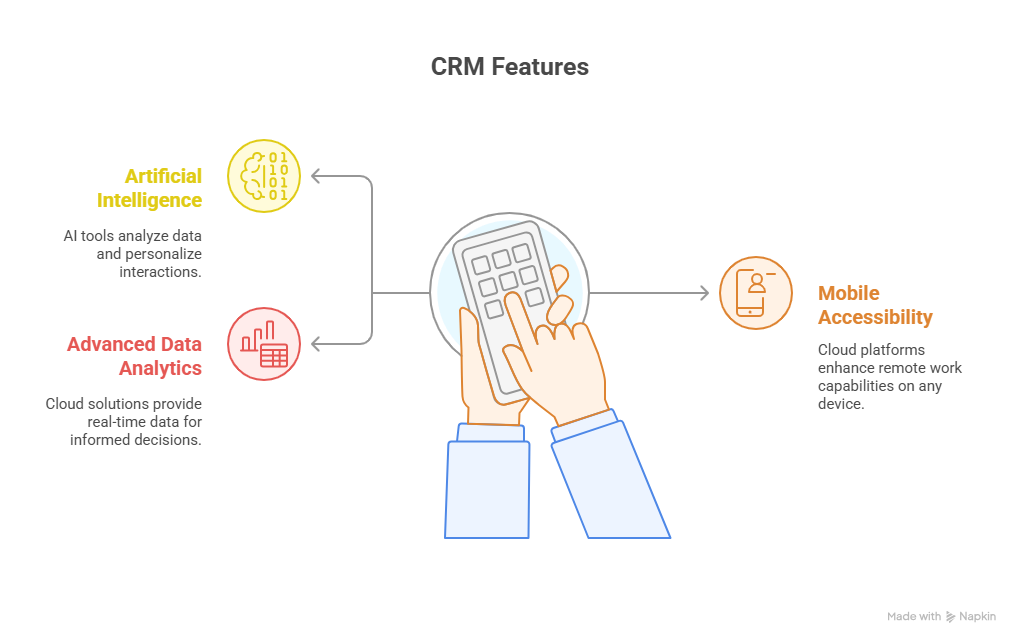Did you know that businesses using CRM software solutions see an average increase of 29% in sales? This significant boost is just one of the many benefits that come with adopting modern customer management practices.
In today’s fast-paced business environment, managing customer relationships effectively is crucial for success. Companies are turning to innovative CRM solutions to streamline their customer management processes and enhance collaboration among teams.
By leveraging cloud-based CRM tools, businesses can drive growth, improve customer satisfaction, and stay ahead of the competition. As the business landscape continues to evolve, it’s clear that these solutions are not just a trend, but the future of customer management.
The Evolution of Cloud-Based CRM Tools
The evolution of CRM tools has been significantly influenced by cloud technology. This shift has transformed the way businesses manage customer relationships, making it more efficient and accessible.
From On-Premise to Cloud Solutions
The transition from on-premise CRM solutions to cloud-based platforms has been a game-changer. Cloud CRM platforms offer greater flexibility, scalability, and cost-effectiveness compared to traditional on-premise solutions.
Some key benefits of cloud CRM include:
- Reduced infrastructure costs
- Enhanced data security
- Improved collaboration among teams
- Automatic software updates
Key Technological Advancements Driving Adoption
Several technological advancements have driven the adoption of cloud CRM platforms. These include:
- Artificial Intelligence (AI): AI-powered CRM tools can analyze customer data, predict behavior, and personalize interactions.
- Mobile Accessibility: Cloud CRM platforms can be accessed from anywhere, on any device, enhancing remote work capabilities.
- Advanced Data Analytics: Cloud CRM solutions provide real-time data analytics, enabling businesses to make informed decisions.

Current Market Trends in CRM Implementation
The current market trends indicate a growing demand for integrated CRM solutions that can be accessed remotely. Businesses are looking for best CRM tools that can help them respond quickly to changing customer needs.
Some of the current trends include:
- Increased adoption of cloud CRM among small and medium-sized businesses
- Growing importance of customer experience and personalization
- Rise of AI and machine learning in CRM solutions
By understanding these trends and advancements, businesses can make informed decisions about their CRM strategies and choose the best CRM tools that fit their needs.
Benefits of Implementing a Cloud CRM Platform
The shift to cloud CRM platforms is driven by numerous advantages that enhance business efficiency. As businesses continue to navigate the complexities of customer relationship management, adopting a cloud-based solution can be a game-changer.
Accessibility and Remote Team Collaboration
One of the primary benefits of cloud CRM platforms is their ability to facilitate remote team collaboration. With top cloud CRM software, teams can access customer data and sales tools from anywhere, at any time, as long as they have an internet connection. This enhanced accessibility enables businesses to work more efficiently, even with distributed teams.
Cloud CRM solutions also provide real-time updates, ensuring that all team members are on the same page. This leads to better communication, reduced errors, and improved customer satisfaction.
Cost-Effectiveness for Businesses of All Sizes
Cloud CRM systems are often more cost-effective than traditional on-premise solutions. By reducing the need for hardware and maintenance, businesses can save on upfront costs and allocate resources more efficiently. CRM system providers offer scalable pricing models that cater to businesses of all sizes, making it easier for companies to find a solution that fits their budget.
| Cost Component | On-Premise CRM | Cloud CRM |
|---|---|---|
| Hardware Costs | High | Low |
| Maintenance Costs | High | Low |
| Scalability Costs | High | Low to Moderate |
Scalability and Integration Capabilities
Cloud CRM platforms are designed to scale with businesses. As companies grow, their CRM needs evolve, and cloud solutions can adapt quickly to these changes. Top cloud CRM software providers offer a range of integration capabilities, allowing businesses to connect their CRM with other essential tools and systems.
This scalability and flexibility enable businesses to respond to changing market conditions and customer needs more effectively.
Enhanced Data Security and Compliance Features
Leading CRM system providers prioritize data security and compliance, ensuring that businesses can trust their customer data to these platforms. Cloud CRM solutions implement robust security measures, including encryption, access controls, and regular backups, to protect sensitive information.
- Data encryption at rest and in transit
- Multi-factor authentication and access controls
- Regular security audits and compliance certifications
By adopting a cloud CRM platform, businesses can benefit from enhanced data security and compliance features, reducing the risk of data breaches and non-compliance.
Top Cloud-Based CRM Tools for Different Business Needs
Cloud-based CRM tools have revolutionized customer management, offering a range of solutions tailored to different business needs. With the variety of options available, businesses can now select a CRM tool that aligns with their specific requirements, whether it’s for small to medium-sized businesses, large enterprises, or industry-specific needs.
Best CRM Solutions for Small to Medium Businesses
For small to medium businesses, CRM tools that are easy to implement and use are crucial. These businesses require solutions that can help them manage customer relationships efficiently without needing extensive technical expertise.
- HubSpot CRM: Known for its user-friendly interface and robust features, HubSpot CRM is a popular choice among small businesses.
- Zoho CRM: Offers a range of features, including sales automation and marketing tools, making it a versatile option for growing businesses.
- Pipedrive: Focuses on sales pipeline management, helping businesses to track and manage their sales processes effectively.
Enterprise-Grade CRM System Providers
Enterprise-grade CRM system providers offer more complex solutions designed to handle large volumes of customer data. These solutions are tailored to meet the needs of large organizations with multiple departments and complex sales processes.
| CRM Provider | Key Features | Target Businesses |
|---|---|---|
| Salesforce | Advanced analytics, customization options, integration with other Salesforce tools | Large enterprises, complex sales processes |
| Microsoft Dynamics 365 | AI-driven insights, robust security, integration with Microsoft Office 365 | Enterprises with existing Microsoft infrastructure |
| Oracle CRM | Comprehensive customer view, advanced marketing automation, robust sales tools | Large enterprises with complex customer management needs |
Affordable Cloud CRM Options with Strong ROI
Affordable cloud CRM options with a strong return on investment (ROI) are available, making it possible for businesses of all sizes to benefit from CRM technology.
- Freshsales: Offers a user-friendly interface and a range of features at an affordable price.
- Capsule CRM: Provides a simple and intuitive CRM solution for small businesses.
Industry-Specific CRM Solutions
Industry-specific CRM solutions cater to the unique needs of different sectors, such as healthcare or finance.
For instance, CRM solutions for healthcare providers might include features such as patient management and appointment scheduling, while CRM solutions for financial institutions might focus on client portfolio management and compliance.
Conclusion
As businesses continue to navigate the complexities of customer management, the importance of adopting cloud-based CRM tools cannot be overstated. By leveraging these innovative solutions, companies can significantly enhance their customer engagement practices, improve team collaboration, and drive business growth.
The benefits of cloud-based CRM tools are multifaceted, offering businesses of all sizes a cost-effective, scalable, and secure way to manage customer relationships. With the ability to access critical customer data from anywhere, businesses can respond quickly to changing market conditions and customer needs.
By understanding the various cloud-based CRM tools available, businesses can make informed decisions about their customer management strategies. Whether you’re a small business or a large enterprise, there’s a cloud-based CRM solution designed to meet your specific needs. As the business landscape continues to evolve, adopting cloud-based CRM tools will be crucial for staying competitive and achieving long-term success.
FAQ
What are cloud-based CRM tools, and how do they differ from traditional CRM systems?
Cloud-based CRM tools are customer relationship management solutions hosted online, allowing businesses to access them remotely. Unlike traditional on-premise CRM systems, cloud-based CRM tools are more flexible, scalable, and cost-effective, reducing the need for hardware and maintenance.
How do cloud CRM platforms enhance team collaboration and customer management?
Cloud CRM platforms facilitate remote team collaboration by providing a centralized platform for customer data, enabling teams to work more efficiently and respond quickly to changing customer needs. This leads to improved customer satisfaction and loyalty.
What are the benefits of using affordable cloud CRM options for small businesses?
Affordable cloud CRM options offer small businesses a cost-effective way to manage customer relationships, providing a strong return on investment (ROI). These solutions are often easy to implement and use, making it possible for small businesses to benefit from CRM technology.
How do top cloud CRM software providers ensure data security and compliance?
Top cloud CRM software providers prioritize data security and compliance by implementing robust security measures, such as encryption, access controls, and regular backups. They also comply with relevant regulations, such as GDPR and HIPAA, to ensure the protection of customer data.
Can industry-specific CRM solutions cater to the unique needs of different sectors?
Yes, industry-specific CRM solutions are designed to meet the unique needs of different sectors, such as healthcare, finance, or retail. These solutions provide tailored features and functionality that address the specific challenges and requirements of each industry.
What are the key considerations when selecting a cloud-based CRM tool for my business?
When selecting a cloud-based CRM tool, consider factors such as scalability, integration capabilities, user experience, and cost. It’s also essential to assess the CRM tool’s ability to meet your business’s specific needs and goals, as well as its compatibility with your existing systems and processes.

